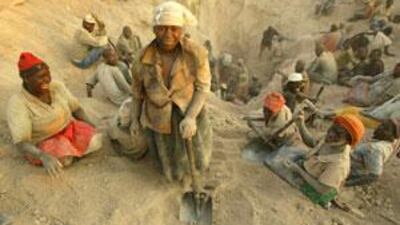CHIADZWA, Zimbabwe // Villagers in an arid corner of Zimabawe are resisting government efforts to relocate hundreds of families from their ancestral homeland to make way for a diamond mine. "We do not want to leave and they [the government] know that," said Filda Tarindwwwwa, head of Zengeni village, in the Chiadzwa communal area. "Our ancestors are buried here, among the diamond fields. We will die here and be buried in the diamond fields. We belong here and we identify culturally with this area."
Chiadzwa, 300km east of Harare, was the scene of extensive free-for-all illegal diamond mining after the discovery of the precious mineral in May 2006. The government drove panners out in August this year. Proper mining started last month. Two mining firms, Mbada Diamond Mining and Canadile Miners, have partnered with Zimbabwe Mining Development Corp (ZMDC), a government parastatal organisation, to exploit the mineral.
As organised mining starts, 1,800 households have to be moved from the 70,000 hectares Chiadzwa claims to Arda-Transau, 100km to the west, to ensure the diamond fields are safe from intruders. In their first two months on site, the investors poured in US$150 million (Dh550m) in enhancing security, building an airstrip, houses, roads and securing electricity and machinery. Sales of the mineral had been expected to start before the end of this year, Mbada said.
But villagers are refusing to leave. They demand employment or a portion of the diamond fields to mine. Witness Kusena, of Kusena village, whose home is within the diamond claims, said the discovery of diamonds has been a curse for the community. "We want to benefit through mining because the diamonds are ours. But it must be known that this is a very arid area and droughts are the order of the day. Over the years of perpetual droughts, they never saw it fit to give us land to farm such as what they are promising us at Arda-Transau. We have diamonds now and suddenly they have found such a prime farming area for us."
Arda-Transau offers 12,000 hectares of farmland. The government and its partners are building five-room houses. Each will have half a hectare of irrigable land and half a hectare for dry-land farming. Schools, clinics, roads and other infrastructure will also be constructed in the $10m project. Murisi Zwizwai, the deputy minister of mines and mining development, told the official Herald newspaper recently that relocation may take place after villagers have harvested their crops in April.
Touring Chiadzwa last month, Joel Gabuza, the minister of state enterprises and parastatals, said a week of production at the minefield can support the country's civil service's annual wage bill of $600m. In March, before the new investors came on board, the ZMDC was extracting between 50,000 and 60,000 carats per week at Chiadzwa. Recent reports say production has now trebled as proper machinery and technology are being used.
"The carats that are being extracted per week add up to a substantial amount. But with the equipment we saw, this will certainly increase. This shows that our diamonds could solve our fiscal problems," Mr Gabuza said. Robert Mhlanga, the chairman of Mbada, said Zimbabwe can pin hopes for economic recovery on the diamonds. "Our mission, therefore, is to turn the Chiadzwa diamond fields into Zimbabwe's economic miracle as there are enough deposits to drive this country's economy to greater heights."
But the villagers have recently escalated their resistance. On December 14, the Chiadzwa Community Development Trust, acting on behalf of the 1,800 households, filed an urgent chamber application at the High Court in Harare, seeking an order preventing their relocation until the issue of compensation has been finalised. "As the eviction of the affected families looms," said the trust in the High Court papers, "there is no information about compensation they will receive, how it will be calculated and whether houses and other amenities will be provided for them at their destinations. These are matters that should be agreed before any relocation is contemplated or effected.
"The applicants and affected families stand to suffer irreparable harm if the interdict is not granted because they will lose their property in Chiadzwa which they will be forced to abandon." foreign.desk@thenational.ae

